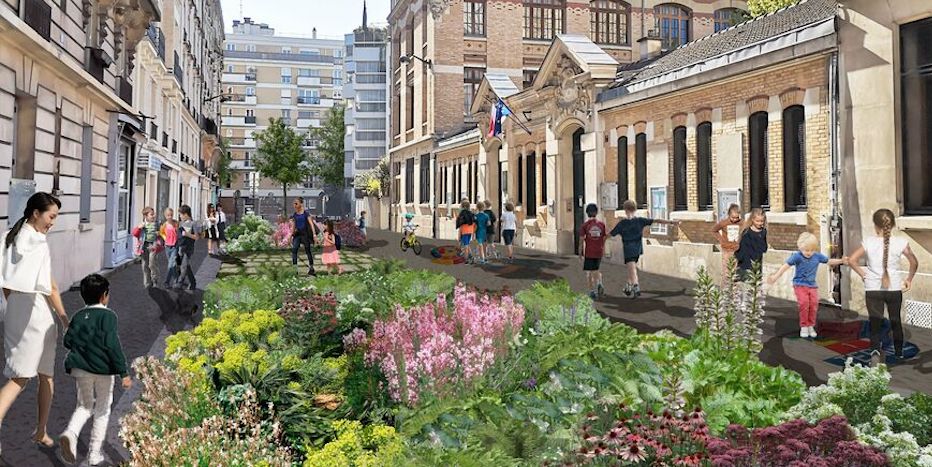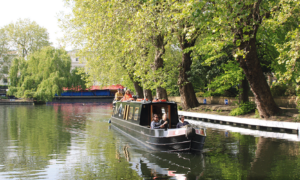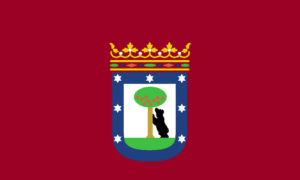Anne Hidalgo, the mayor of Paris, has set herself the goal of drastically reducing car traffic in the city centre of Paris. In pursuing this goal, and in many other ways, she is not unanimously supported by Parisians, but that isn’t quite the topic of this article. Instead, I want to write about how Hidalgo’s measures have concretely impacted my daily life in Paris.
Her first mandate was marked by a tug of war over the pedestrianisation of the banks of the Seine – a godsend, especially when it comes to sipping an Aperol Spritz in the summer by the river – and she is now tackling road traffic in the whole of Paris. The aim of these measures is to introduce a “limited traffic zone” by mid-2022. She has implemented relevant laws, such as one that reduced the allowed speed from 50 km/h to 30 km/h, and she is now pedestrianising roads around schools, which includes the street on which I live.
The project aims to create 80 “rues aux écoles” (streets for schools) and was launched at the start of the 2020 school year. This scheme has contributed to making the streets surrounding about a hundred schools in Paris much more pedestrian-friendly. Today, there are 125 such streets throughout Paris: most of these are completely closed to traffic, while the others are only closed to traffic during school entry and exit times.
The street on which I live has completely metamorphosed. My balcony now overlooks a beautiful pedestrian way adorned with trees and plants; disregarding the four disruptive months from July to October during which the construction works took place, I honestly think the difference to my life has been a considerable improvement.
First things first: my sleep. Not being woken up at 6 a.m. by garbage trucks, or in the middle of the night by cars speeding, is a blessing, and I don’t think I can emphasize how much this has impacted the quality of my sleep for the better.
The reduction in noise pollution is substantial, and I would not swap this for anything, even though it means that it is harder for me to park my car.
I am not the only one delighted by being able to open our building door to such lovely greenery: my dog is as well! He frolics in the plants as if he is the happiest pup on earth. We used to live in Singapore, where he had access to a garden. I could tell that he really missed green spaces and so whenever I had the time I’d walk him to a park. But he now has access to a green space every single time we go on a walk.
Happy dog, happy owner!
It seems that the children going to the school in front of my flat are also happier; they stay outside their school for longer at the end of the school day, and the sound of their chuckles and cheerfulness resonates in the street, which adds some much-needed liveliness to neighbourhood life.
These new measures follow some earlier car reduction efforts, such as the initiative that started in 2013 where the entire city of Paris is closed to cars and motorised two-wheelers for one day every year. On this motor vehicle-free day, Parisians bid farewell to their cars, and the city is reserved for non-polluting means of transportation such as walking, cycling, rollerblading, riding scooters, and skateboarding.
These efforts implemented by Mayor Hidalgo aim at reducing not only air pollution but sound pollution too, and I think that, although these days without cars are unfeasible as an everyday occurrence, it is nevertheless a great way of reminding Parisians that cycling*, walking or travelling by Metro is actually nicer, and much more convenient than driving.
(Author’s note:These traffic reduction initiatives synergise with ongoing efforts to encourage more Parisians to cycle, but I’ll direct you to Stephen Heiner’s writing on this topic.)

About the author:
Pauline Lemaire is a Digital Anthropology Masters student at University College London (UCL), and is thus currently based in London. She grew up in Singapore and Morocco, but her family has now relocated to Paris.
She holds a bachelor’s degree in French Literature and Philosophy from the University of Oxford.
After completing her Digital Anthropology Masters at University College London (UCL) Pauline Lemaire currently is based in Geneva, Switzerland. Pauline grew up in Singapore and Morocco, but her family has now relocated to Paris.
She holds a bachelor’s degree in French Literature and Philosophy from the University of Oxford.















